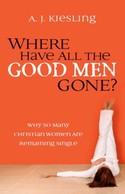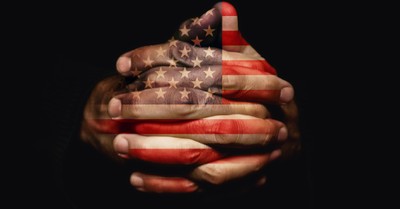The Lost Girls
- A.J. Kiesling Crosswalk.com Contributing Writer & Author
- Updated May 09, 2008

EDITOR’S NOTE: The following article is adapted from A.J. Kiesling’s Where Have All the Good Men Gone? (Harvest House).
In the story The Emperor’s New Clothes, everyone ignores what they can plainly see—the emperor’s shocking nakedness—because groupthink encourages them to believe what they’ve been told versus what they know to be true.
Sometimes it feels like the same thing is happening among Christian singles in our postmodern society. We are told that singleness is a special season of grace from God, a time to be devoted solely to spiritual matters, a time to have fun before we are weighed down by the responsibilities of marriage and children. Yet privately many (if not most) of the singles you talk to long to find “the one,” growing tired of the endless round of group activities as the years tick by. Everyone is supposed to be happy-happy-happy, enjoying these carefree days of singleness, but like the awkward specter of the emperor’s nakedness, the unspoken subject hangs in the air: most of us want to get married and enjoy loving, committed relationships.
At a meeting of my singles Bible study one night the topic turned, awkwardly, to marriage and the frustrations of singleness. As usual whenever we discussed this subject, it was a woman—in this case, me—who initiated the tack change in conversation.
“Why do you think it’s so hard to get married today?” I asked. Several other women nodded their agreement with the question, suddenly keenly interested. A couple of the guys sank deeper into the sofa or fidgeted on their chairs.
“What do you mean?” a man in the group replied, the look of incredulity on his face genuine. “People get married every day. They fly off to Vegas and get married at the drop of a hat. I think our culture makes it too easy to get married. It’s not treated seriously anymore.”
He had a point, but it was not the one I was driving at. “What I mean to say is why is it so hard to get married? Look at us—fifteen attractive men and women of marriageable age all wanting to find a mate, yet nobody is getting together and each of us is waiting for ‘the one.’ Why can’t we find someone to marry?”
Ultimately it proved to be almost a rhetorical question, but the asking sure launched a firestorm of opinions for the next forty-five minutes. This question didn’t pop randomly into my head that evening at Bible study. It was something I’d been mulling over for quite some time. At the singles functions I attended, I couldn’t help but notice how many attractive women milled around, trying to be sociable and likable, and most of all trying to get noticed. The guys were there too, of course, but generally ran fewer in number—sometimes as little as one man to every four or five women. What struck me, however, was that these weekly gatherings (in this case, at a large church) gradually came to seem like the last place in the world to meet someone interesting of the opposite sex.
Welcome to the Twilight Zone
In conversations with some of my single girlfriends, we joke that being single and Christian in the modern world is like living in The Twilight Zone. We bolster each other with our humor, wisecracking and telling first-date horror stories from our ventures into the netherworld of online dating, but sometimes the reality of living in this odd parallel universe is anything but funny.
And then there’s the weirdness of getting back “out there” after years of being off the market, so to speak. Crass as it sounds, there really is a lot of truth to the whole “market” mindset, and you find that out fast once you enter this subterranean world of commodity shoppers—especially now that finding someone to date online has become mainstream, no longer a recourse only for the bolder among us.
To all those happily married people out there who met their spouses online, please don’t be offended by my words. As I said, the “tales from the front lines” make for good laugh sessions with your girlfriends or entertaining family members at holiday gatherings. Yet beneath all the laughter and eye-rolling, I find myself growing disillusioned by degrees, and my thoughts go something like this: Do I really want my love story to begin with ‘Well, there was this website, and he saw my photo and I saw his, and then he e-mailed me…’?
The happy couples who do end up together after an online “match” don’t seem bothered by this lack of mystery at the outset. Somehow, though, I think I was born one of those who must have mystery and romance and longing and finally longing fulfilled. I sit in darkened theaters watching the latest remake of a Jane Austen classic, and my eyes well up with tears. Call me odd perhaps, but there’s a whole subculture of postmodern women like me who can’t quite reconcile the flat, perfunctory nature of modern dating with the bittersweet tension of romances from an earlier era that we read about in books or watch on-screen. We long for something more—and, fortunately, many of the guys out there do too.
Our challenge then is actually finding one another and stemming the tide of a culture gone awry. As it turns out, finding each other may be the easy part. Altering who and what we’ve become—and how the culture has changed both the inner and outer landscape of single adulthood—may prove to be the real obstacle.
Culture Wars
Certainly I’m not the first one to notice the difficulty today’s singles have in making long-lasting commitments, much less finding the one they want to spend the rest of their lives with (if we are even capable of such a commitment). Nor am I the first to write a book about it. In Unhooked Generation: The Truth About Why We’re Still Single, author Jillian Straus relates how she first became aware of this social pandemic.
Straus interviewed one hundred singles from six cities in different geographic locations. As she talked with them, over and over again the people she interviewed said it was hard to meet other singles because of where they lived. “In other words, I saw crowds of people all looking for someone special—all unable to find what they were looking for, and all convinced the problem was where they lived. It was clear to me that geography was not the problem, however—the problem had something to do with the seeker’s approach.”2
We Are What We’ve Become
Ultimately Straus concludes that it isn’t anyone’s imagination; it is harder to find lasting love in today’s culture, and she identifies seven “evil influences” that have changed us from the inside out: 1) a self-serving “what’s-in-it-for-me?” culture, 2) a multiple choice culture, 3) the effect of divorce, 4) the feminism fallout, 5) a “why suffer?” mentality, 6) the celebrity standard, and 7) delayed marriage. Before I even stumbled across Straus’ book, many of these themes had already cropped up in the responses I culled from my own research and general observations.
It’s hard to ignore the validity of this list of influences. As you read through the responses of single men and women in this book, you’ll hear these same themes, often worded in different ways and going by different monikers, but still there all the same. The real question that emerges, in the wake of groundbreaking books such as Straus’, is: Why a book about Christian singles? Why break out this subset of singles from the larger culture and focus an entire book about their struggles to find mates? The answer is simple: Because Christian singles, although a subset of the singles culture as a whole, are supposed to be a very different subset—viewing marriage as a positive thing, God’s appointed arrangement for how to get our intimate and romantic needs met. Unlike our non-Christian cohorts, we’re not supposed to embrace the overwhelmingly pervasive trend of living together out of wedlock, casual “hookups” in our search for a soul mate, or reckless serial monogamy, leaving a trail of broken hearts in our wake (and sometimes having our own broken in the process).
Yet looking around at the surplus of singles in the church—some hopeful, some desperate, some mildly bored, others depressed or even despairing—it’s plain to see that all is not right in Christendom. Somehow we’ve taken what was meant to be a very natural process (boy meets girl, boy woos girl, boy marries girl) and turned it into what can seem at times a virtual impossibility.
The truth, of course, is that while we Christian singles are a subset of society, we are more influenced by our culture than we may think. In a very real sense Christians have always “warred” with the culture they live in, and it’s a battle with a strong opponent. I suspect contemporary Christian singles are reaping the harvest of decades’ worth of seeds sown askew in the culture at large. The sexual revolution; the women’s liberation movement; women pouring into the workforce; a generation of children growing up in daycare centers; the powerful influence of entertainment media in a sexualized culture; mind-boggling divorce statistics; cohabitation replacing the marriage covenant—all these and more have combined to change the way men and women interact with one another, and we Christians are not exempt from the fallout.
Hearing from Real Singles
I went in search of answers, not to try to solve the big cultural-shift types of problems cited above, but to hear from real men and women who professed faith in God yet found themselves single despite their wishes to the contrary.
At first I planned to target only Christian women in my survey, but soon it became clear that this was an issue both genders are passionate—and perplexed—about, though women are the most vocal. I logged onto Christian singles forums across the Internet, putting the word out about a survey I created to hear from these real-world single men and women. The responses trickled in at first then gained momentum. What I heard—and what I share with readers in Where Have All the Good Men Gone?—may surprise and even frustrate you, but lasting change can only begin with the truth.
2Jillian Straus, Unhooked Generation: The Truth About Why We're Still Single (New York: Hyperion, 2006), 2-3.

You can reach her at www.ajkiesling.com or by e-mailing her at goodmengone@gmail.com.



















